Updated: August 26, 2022.
Learn what Google passage ranking is and whether it should be an important consideration in your SEO strategy.

Google passage ranking (also called passage indexing) was one of the biggest announcements around search in 2020. Even though this was only a small ranking change in Google, the topic generated a lot of discussions and misconceptions almost immediately.
It was all due to the unfortunate wording “passage indexing” that Google used when announcing this change for the first time. The word “indexing” made many people think that Google now will be indexing the passages of web pages rather than entire web pages.
I deeply analyzed all the available information on Google passages to be able to present it in a digestible form here in this guide.
Passage-based ranking and indexing: the gist
Passage ranking (also referred to as passage indexing) means that Google can now rank individual passages of a web page.
Passage ranking is sometimes referred to as passage indexing but it has nothing to do with indexing. This is a ranking change.
- The goal of passage-based ranking is to surface in search results web pages that have poor content structure (e.g. no headings, no clear sections, etc.), cover multiple topics, or lack any SEO optimizations.
- You don’t need to optimize for passage ranking
- The passage-based ranking may help long and diluted content rank for more specific queries that answer specific questions.
- Passage-based ranking will come into effect in December 2020 or January 2021.
- This is an internal and small change within Google. It requires no action on the part of SEOs or webmasters.
- Passage-based ranking will affect about 7% of queries once it is fully rolled out worldwide.
If you are an SEO and your website is optimized in terms of SEO, there is really nothing for you to do (but learn about this topic simply out of curiosity).
UPDATE: Passage-based ranking has been live since February 20211. I personally have not noticed any changes to my website or my clients’ websites. If you have noticed anything, please let me know.
⚡ Google page experience signals are becoming a THING. Check my Google page experience audit to learn how to audit a site in terms of the Google page experience signals. Do not miss my Core Web Vitals audit either.
Passage ranking and indexing: the details (FAQ)
The term passage indexing appeared for the first time in the Google movie “Search On 2020” and it was one of the big announcements around Google Search for the year 2020.
Here it is:
The unfortunate wording “indexing” caused quite a lot of stir among SEOs who were a bit disturbed that “Google will now be indexing parts of a page”.
Google admitted to choosing the wrong name and quickly went on to explain that passage indexing is in fact a ranking change, not an indexing change.
Below are all the details you might want to learn about Google passages.
⚡ I have created an extensive list of on-page SEO factors. I invite you to check my on-page SEO checklist with 70+ on-page SEO factors.
What is passage-based ranking?
Passage-based ranking means that Google can use specific passages of web pages for ranking purposes. This is possible because Google can now better understand specific passages of a web page and decide if a given fragment of text best answers a specific query.
A Google passage is simply a passage of text that Google understands and analyses separately from the whole web page on which it appears.
As Google puts it, passage-based indexing will help find “that needle in a haystack” because now Google will not only understand the overall topic of the web page but also the specific subtopics each passage relates to.
For example, I might type a very specific query like “how can i make sure that my website is indexable”.
This is a very specific query. I am looking for a quick answer with a tip on how to check if my website can be indexed by search engines. Here is what we get right now:
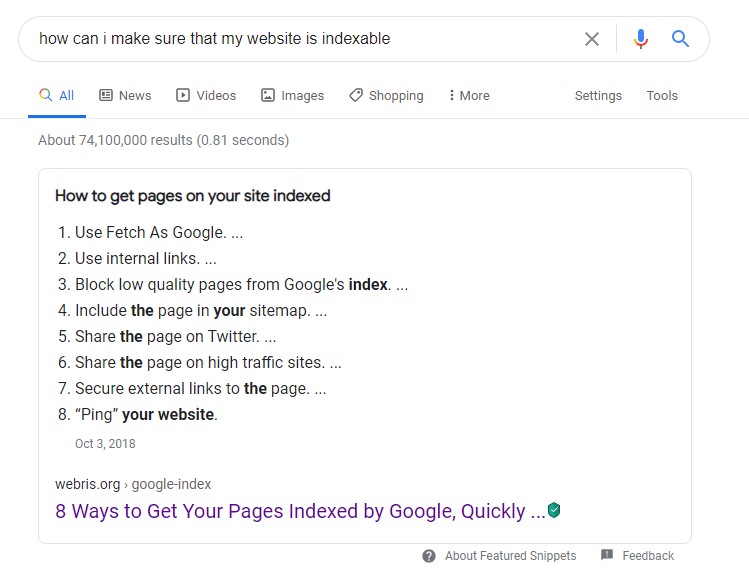
Okay, I am getting tips on how to get my website indexed. I scroll down and the results are still similar.
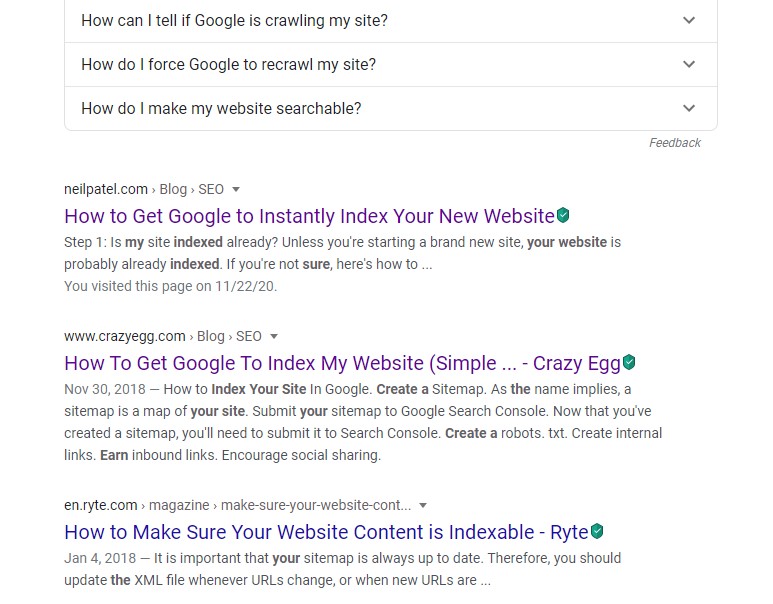
These are mostly longer in-depth guides on how to get Google to index a website. This is not exactly what I am looking for.
I imagine this is a situation where passage-based ranking might come in very useful. Google will surface a passage that exactly answers my query instead of showing these in-depth guides that cover a slightly broader topic.
Going further with this example, Google might surface a passage from my guide on how to do an SEO audit that is not specifically about how to index a website but which precisely answers my question in one of its passages.
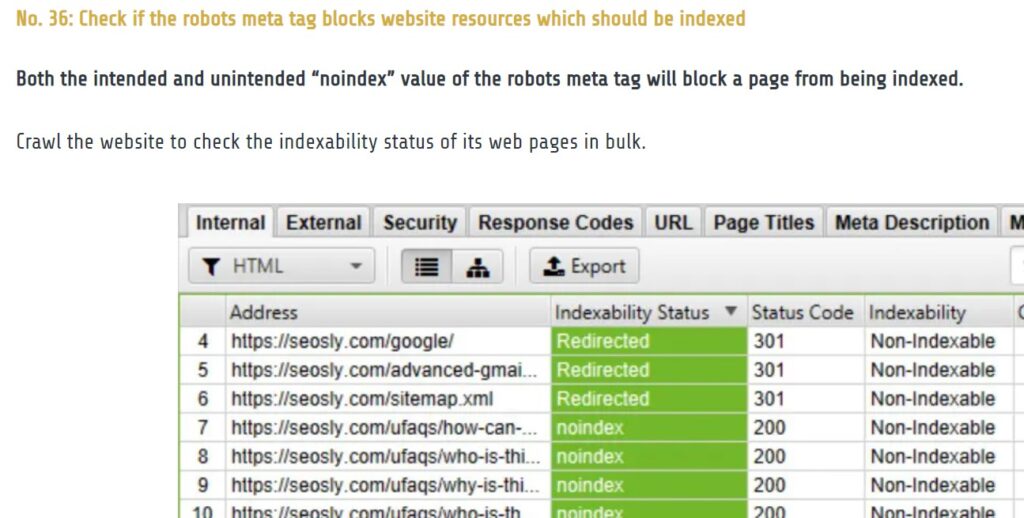
⚡ Make sure to check my website redesign SEO checklist.
What passage ranking is not?
Whether you call it passage-based ranking or passage-based indexing, Google passages are not an indexing change.
- Passage ranking does not mean that Google can now index only passages of web pages.
- Passage ranking does not affect indexing in any way.
- Google is still indexing entire web pages just like it used to.
The change is that Google will also take into account the meaning of passages when deciding on the most relevant results to show for a given query.
Passage-based ranking is often called passage indexing because that is the term Google used when it was announcing this new feature for the first time in mid October 2020.
Since that time Google has confirmed multiple times that passages are all about ranking, not indexing.
Here is what Martin Splitt says about this In an SEJ webinar on Google Passages:
And this Twitter thread from Google SearchLiaison also explains it in a pretty straightforward way:
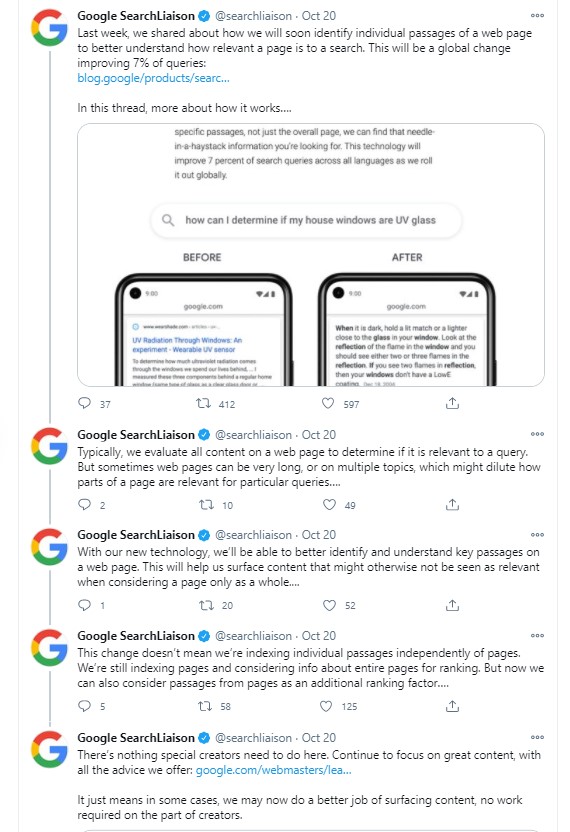
What is the purpose of passage ranking?
We can think of passage ranking as a way to help surface web pages that might not be considered relevant if Google was analyzing a web page as a whole.
With passages, when ranking, Google can take into account both the meaning of individual passages and the information about the entire page.
The end goal is, of course, to provide the best results that best answer user queries.
And here is another valuable quote from Martin Splitt:
“It is just a smaller change where we try to help those who are not necessarily familiar with SEO or how to structure the content or a content strategy because lots of people end up creating these long-winded pages that are having a really hard time ranking for anything really because everything is so diluted in this long-form content”.
Martin Splitt
What types of web pages can benefit from passage-based ranking?
Google passage-based ranking will be a great opportunity for web pages that:
- cover multiple topics,
- have diluted content not focused on one main topic,
- cover a very general topic,
- have poor information structure (do not use headings, subheadings or paragraphs),
- have not been optimized by an SEO.
It looks like both big and small websites are going to benefit from Google passages. Here are 2 examples I can think of:
- A small travel blog run by an individual. The blog is not SEO-optimized and contains accounts of travels to different countries. The posts on the blog are not focused on one specific topic but contain information with hands-on experience and tips that Google may want to surface at one point.
- A huge health website covering many various health topics and containing lots of long general guides. In each of its articles and guides, the website covers multiple and more general health topics like a healthy lifestyle or a healthy diet. With Google passages, these general guides will have a chance to rank for very specific queries too.
⚡ Check my guide to Google Search Console crawl stats report.
What will Google passages look like?
Passages in search results are going to look like regular organic results (i.e. blue links). Here is how Google visualizes it:
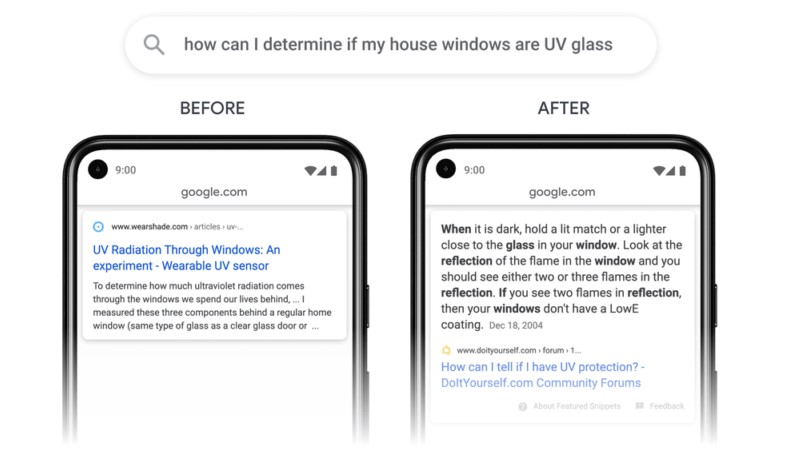
This is how a passage might look in search results.
UPDATE: Google has recently clarified that passages are not going to look like featured snippets. It won’t be possible to say if a given result from a passage.
How does passage ranking differ from featured snippets?
Featured snippets and passages are two completely different things. Here are the main differences between the two:
- With featured snippets, Google displays and highlights a passage of content from a web page as an answer to the query.
- Featured snippets show the most relevant passage of a web page which as a whole is considered relevant to the query.
- With passage-based ranking, Google will display the passage that contains the answer to the query.
Here is the quote from Martin Splitt on the difference between featured snippets and passages:
“Internally featured snippets are a completely separate system. In featured snippets we just find a self-contained piece of information on a page and a single page can contain multiple of those and then we might pull this out into a featured snippet and put that as the kind of instant answer to the question that was asked.”
Martin Splitt
And here is all Martin Splitt says about it:
Is there a way to “optimize” for passage-based indexing?
No! There is absolutely nothing we, SEOs, need to do. The passage-based ranking is one of few Google changes that requires no action. This is an internal Google change.
Here comes another quote from Martin Splitt.
“That’s a change that is pretty much purely internal and there is nothing that you need to do. You don’t need to make any changes to your websites, you don’t need to make any changes to any of your pages, to any of your articles or to your markup. There’s no special thing that you need to do”.
“It’s just us getting better at more granularly understanding the content of a page and being able to score different parts of the page independently”.
Martin Splitt
When did passage-based ranking come into effect?
Passage-based ranking has been live since February 2021.
How many searches does this change impact?
The change is going to impact 7% of all the queries worldwide. This is a lot, so we can expect to see some changes.
Will I lose or gain traffic because of passage-based indexing?
That really remains to be seen. I expect that most websites will see improvements because web pages will now be relevant for many more keywords (especially long-tail specific keywords) instead of only those relating to their main topic.
UPDATE: Passage-based ranking has been live since February 2021 and it does not seem to have much impact on search results.
Other articles you will be interested in:

Thanks for posting this information. It helps me eliminate a lot of confusion.
Glad to hear that. You are welcome!
Excellent content and timely delivery. Thanks for posting.
You are welcome 🙂